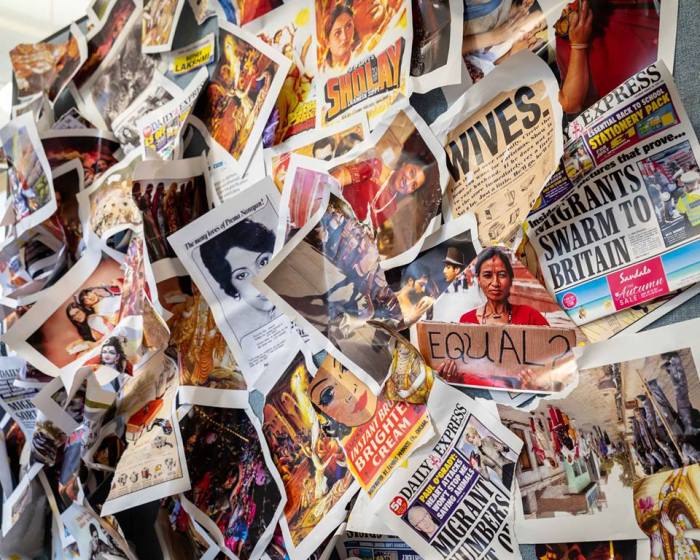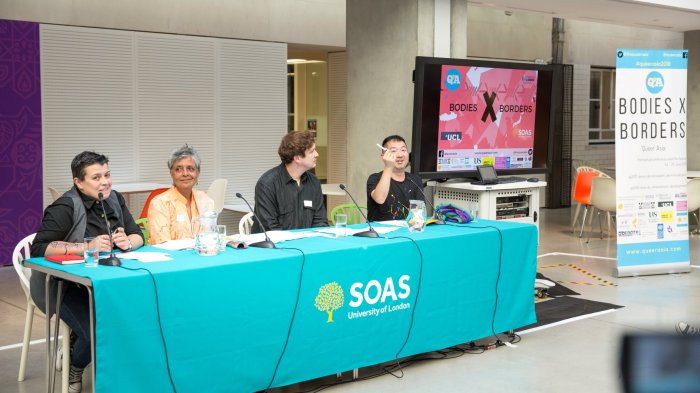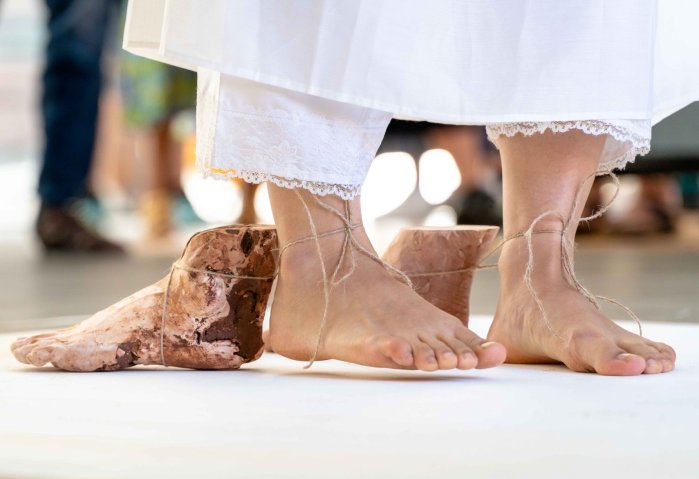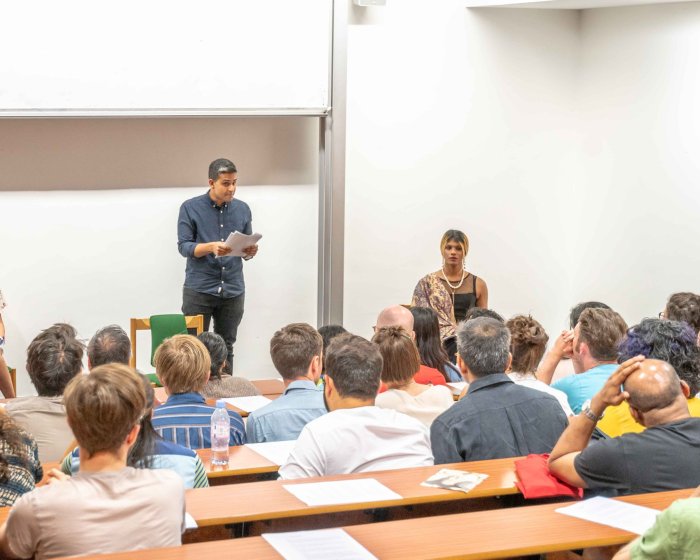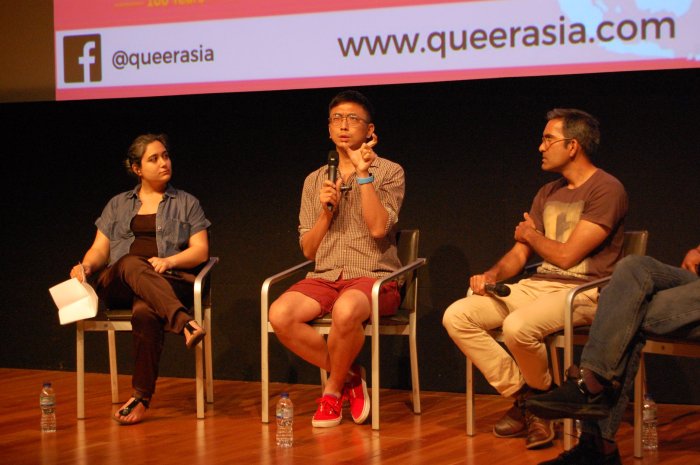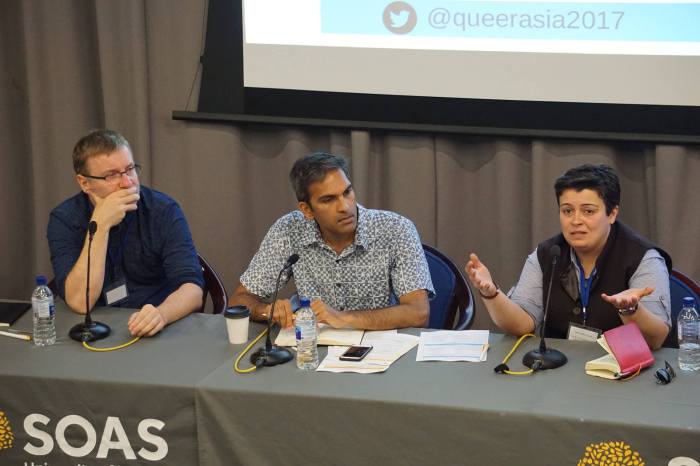QA Blog Series: Building Blocks 1 – Building a Lesbian, Gay, Bisexual, and Transgender Community in the UK.
Posted on 18/02/2019 Written by Laks Mann for the QA Blog Series “Building Blocks – Building a Lesbian, Gay, Bisexual, and Transgender community in the UK curated by QA Co-founder J. Daniel Luther.
The founding of Gaysians and the motivation behind forming this collective.
I’d been out as a gay desi guy for several years and had volunteered with various BAME/POC LGBTIQ+ community initiatives. However, I always felt a slight disconnect with the South Asian queer scene and community. I just hadn’t met many folx who felt comfortable fully embracing their desi queer identities.
That all changed in 2013, when I went along to a workshop as part of the Alchemy Festival at the Southbank Centre. It was organised by Bobby Tiwana entitled ‘Beneath The Surface‘. It told theatrical stories inspired by British Asian lesbian, gay and bisexual lives so as to increase visibility and move away from stereotypical cultural portrayals, which all too often were mostly limited to stereotypes. For the first time I felt like I’d connected with a like minded soul on multiple levels. Bobby and I went on to become good friends and kept in touch with various projects, constantly bouncing around new ideas and concepts for future events.
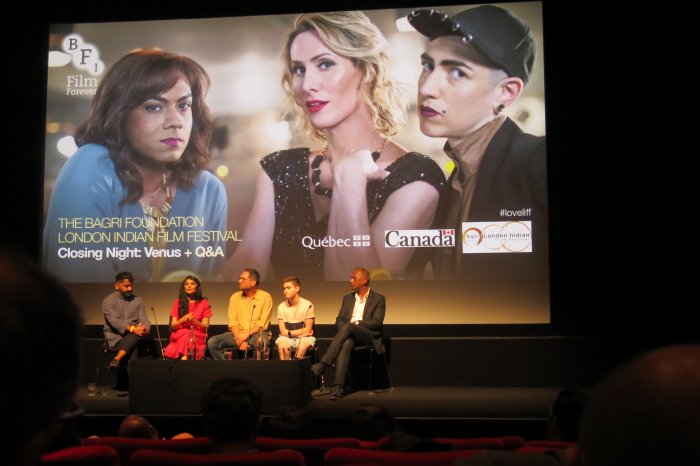
In 2014, Bobby Tiwana returned to the Alchemy Festival with a panel discussion called ‘The Love That Knows Much Shame – can you be both LGBT and South Asian in Britain today?’ By now, the discussions between Bobby and I had begun to revolve around creating a movement, pushing for greater visibility, marching in pride parades, and celebrating our desi queer identities more boldly. Later that year, Bobby registered a marching group for the Pride in London parade called ‘Proud Asian LGBTQ & Allies’ which I fully mobilised behind.
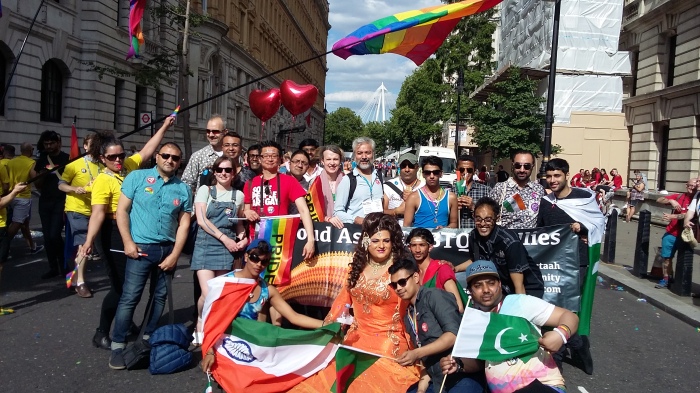
Then in 2015 and again at the Alchemy Festival, Bobby Tiwana took it up a notch with a cafe style interactive event entitled ‘Making Progress or Losing Ground: LGBT Asia‘ which took the discussions further and wider. Soon after I co-signed the second outing of the marching group ‘Proud Asian LGBTQ & Allies’ in the Pride in London parade. After that summer I decided that my own personal project would be bigger, bolder and something that had not been done in the UK before. I was going to create Gaysians, a platform to mainstream South Asian LGBT+ visibility.
So later in 2015, I met with some of the then Board Directors of Pride in London and discussed my plans – to form a collective of artists, activists, charities, and organisations, united under a new concept called Gaysians.
I vowed this new platform would be ready for launch at Pride in London 2017. I then spent the next 2 years contacting desi queer community groups and individuals, following up leads, arranging meetings and phonecalls, and reaching out to as many people as I could in my spare time building on the framework and consolidating the network I had pulled together.
Of particular note, I was always determined to launch Gaysians at Pride in 2017. On a personal level, it marked the 70th anniversary of India’s partition and independence which also resulted in the colonial penal code including the oppressive S377 (now decriminalised) continuing into the newly formed democracy. 2017 was also the same year when the UK would be celebrating the 50th anniversary of the partial decriminalisation of homosexuality in England & Wales. This juxtaposition of anniversaries galvanised something within me, a British born gay guy of Indian heritage who enjoyed legal protections and social freedoms in the country of my birth, yet who would be a deemed a criminal if in my motherland, all because of laws inherited by my birth country!
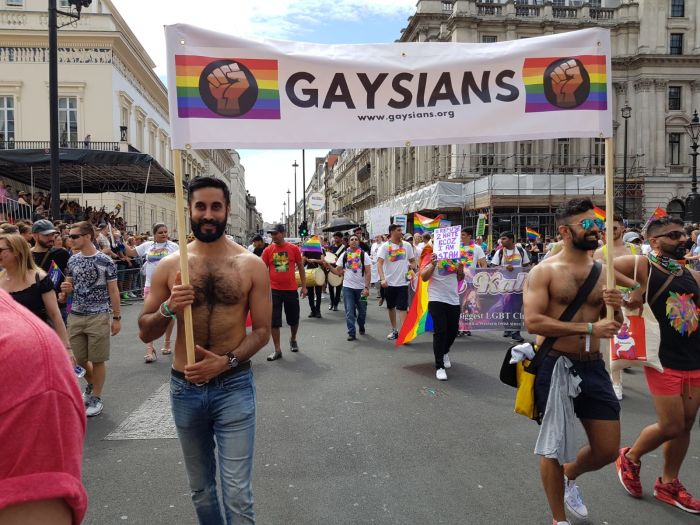
The work of Gaysians in the the queer British Asian community.
A lot of people in the queer British Asian community had some links with others, but to me it was largely a word of mouth thing. The community never fully transcended beyond regions and the visibility of desi queers just wasn’t cutting through to the stagnant narratives taking place within our wider South Asian communities.
Around the same time, I had sensed that desi queers were starting to become more confident, vocal and visible with some really great work being done by many pioneers. Though to me it still felt that some of these efforts were niche, underground and simply weren’t getting the recognition from the wider LGBT+ community that they deserved.
Gaysians was to be the platform that connected all these islands together. Not only in physical settings such as pride parades and social events, but also online and across various social media platforms. That sense of building a community was key, the sum of the parts being greater than each separate island.
I wanted as many people as possible to connect with each other so that collectively we could visibly demonstrate how united, important, and influential the queer British Asian community were becoming. It was all about creating a movement.
My journey though this process.
I was lucky to meet so many amazing and talented people on this journey – some of whom I asked to come on board and become part of the core team as I knew they had skills which the movement needed.
I’ve also grown so much over the past few years, and have truly learned loads while being made aware of so many other people’s inspiring stories along the way. Through these discussions and more, I’ve come to learn and acknowledge the privileges that I have, being male, gay, cisgendered, and having an open and accommodating family who have been accepting towards my sexuality.
There have also been so many personal highlights on my journey with Gaysians:
- leading the marching group at Pride in London 2017
- deciding to launch a woman’s platform for our first event in 2018 which we branded ‘Desi Lesbians – where are you?‘, which got picked up by WOW Festival
- being a panelist at Too Desi Too Queer events discussing mental health and well-being
- forging a partnership with BFI Flare for ‘Brown Is The Warmest Colour’ screenings
- building a mainstream partnership with The Bagri Foundation London Indian Film Festival and hosting their closing gala film Q&A discussing ‘transgender and sexuality’ narratives
- being a flag bearer for the giant rainbow flag at Pride in London 2018 and subsequently being invited to speak on the main stage in Trafalgar Square to thousands of people
- speaking as a panelist about S377 and desi queer narratives at a charity launch attended by 150 influential business and community leaders from London’s South Asian community
- conducting 3 live radio interviews with BBC Asian Network regional shows from within the grounds of UK Black Pride 2018
- being invited in as the opening speaker at the inaugural South Asian LGBTI Conference 2018
- appearing as a speaker at Stonewall’s BAME Showcase 2018 event, which coincided with the day when the Indian Supreme Court decriminalised S377 of the Indian Penal Code
- to numerous other radio phone-ins, interviews and appearances.
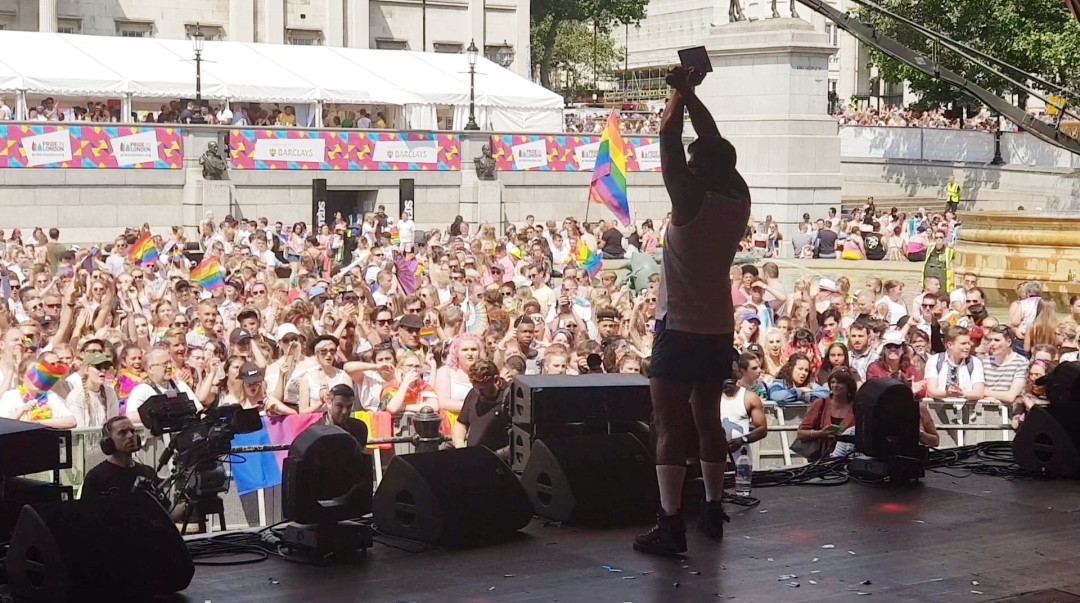
Imagining the future of Asian queer communities in the UK.
I truly do believe that there has been a ground shift over the past few years and that narratives are starting to cut through with Gaysians playing a central role in mobilising those efforts. Whilst some within our community are expecting there to be earthquakes of change, my personal belief is that the movement has firmly taken hold, it’s not about any one individual, organisation or particular group, and that younger generations will be bolder, braver and more vocal in their visibility. I think the combined power of Asian queers in the UK still has some way to go.
I think we will also see more narratives from underrepresented Asian queer voices such as bisexuals, trans and non-binary individuals, much like in the wider global movement of queer narratives.
One area that I’m intrigued about is whether we will see more UK desi queer individuals coming out later in life, perhaps those who had previously entered into heterosexual marriages, had children and maybe even grandchildren.
‘Queer’ Asia’s influence/motivation.
I’m inspired by the name alone — ‘Queer’ Asia —I love it!
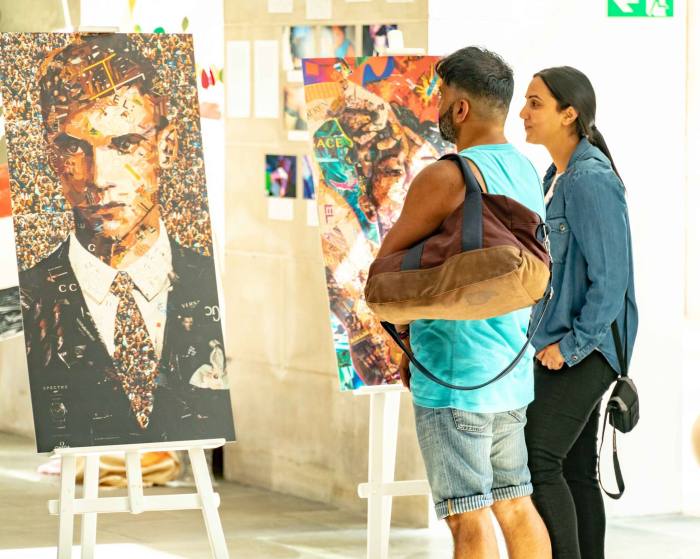
I discovered QA in the Pride in London Festival 2016 programme and was fascinated by the concept. I simply had to know more so attended the inaugural conference and was blown away by the sheer breadth of speakers, countries and queer topics being discussed. A few weeks later I reached out to QA for an after work chat over chai, where I was keen to learn more about their work, and to see if I could bring them on board into the Gaysians partner network I was building. It was such a refreshing conversation and I was truly inspired by their commitment. I knew that QA were going to make big waves and I was so pleased to gain QA’s support for my parade application when I registered Gaysians as a marching group for Pride in London 2017. On the day itself, having QA volunqueers in the marching group was extra special and like everyone else, they had a blast.
I continue to be motivated by QA and have attended all 3 conferences, both film festivals, numerous satellite events, and art exhibitions. I’ve watched the QA collective grow stronger and seen their unique star(s) shine bigger and brighter, such a talented and committed team. I’ve also really enjoyed collaborating with QA on events, including the Gaysians partnerships for the ‘Queer’ Asia Film Festival 2018, alongside Bagri Foundation London Indian Film Festival, and both Too Desi Too Queer events.
I can truly say I’ve made many new friends and connections along the way and I will continue to support QA where I can.



